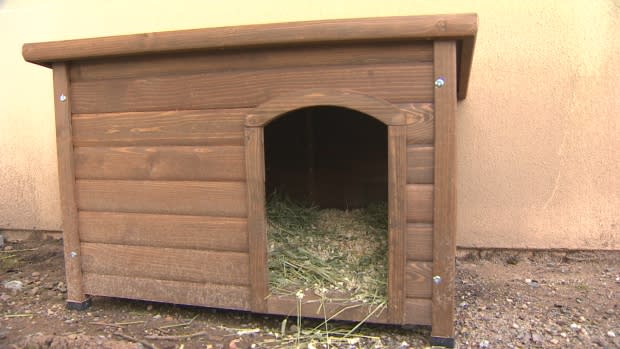Rare bird is the talk of a Halifax retirement home
A bird that's a long way from home is being welcomed with open arms by residents at a Halifax retirement complex.
Last summer, a chukar appeared outside the Parkland Clayton Park and has remained there ever since. The red-billed partridge has since been named Clayton, a nod to the Clayton Park neighbourhood where the retirement facility is located.
Chukars are the national birds of Iraq and Pakistan, and are native to the Middle East and southern Asia. According to the National Audobon Society, they were brought as a game bird to North America and have thrived in some arid regions in the western U.S.
"We have no idea how he got here, but you know, he seems to be faring well so far and he's certainly being well fed and well looked after," said Jennifer Shannon, the general manager at Parkland Clayton Park.
Clayton can generally be found somewhere in the courtyard, which is enveloped by the retirement buildings.

At night, he likes to roost on a ledge on a second-floor window at the corner of a specific building.
"Often when we come in in the mornings, he'll be sitting up there in the corner and you'll see the resident looking out the window at him and talking to him," said Shannon.
She said people were concerned Clayton wouldn't survive the winter, so they called Hope for Wildlife, a wildlife rehabilitation centre, to take him.
"He's been very difficult to catch," said Shannon. "We've had people running around this property on more than one occasion trying to catch him and it turns out he seems to be doing OK so far in the winter.

"We decided that if he wants to stay, we'll let him stay and we'll continue to feed him and look after him and give him places to take refuge."
To ensure Clayton is comfortable this winter, staff purchased a doghouse and placed some hay, pine chips and bird seeds inside of it in the hopes the bird would call it home. Unfortunately, Clayton hasn't been spotted in it yet.
Clayton is fed bird seeds and is particularly fond of sunflower seeds. Residents also feed him bread crumbs.
When Clayton is uncomfortable with the attention, he'll shuffle away or fly a few feet.

Keeping an eye on Clayton has become a part of resident Joan Maddison's daily routine. Assuming she can find Clayton, she feeds the bird three times a day. When she wears her red coat, Clayton recognizes her.
"If I wear my black coat because it's snowing and raining, he's reluctant to come to me, so you know, I'll have to talk to him and then I whistle and he recognizes me," she said.
Shannon said Clayton is welcome to stay at the complex for as long as he wants.
"He makes the residents happy," she said.

